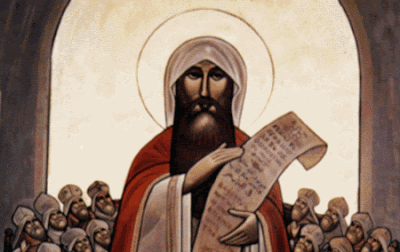source document: Athanasius
 In, De incarnatione, Athnasius contemplates the fallen sinfulness of humanity. Much of this early explanation should sound familiar, Christ upholding the honor of the Father by his sacrifice, for example. But the passage sounds different from popular thinking today:
In, De incarnatione, Athnasius contemplates the fallen sinfulness of humanity. Much of this early explanation should sound familiar, Christ upholding the honor of the Father by his sacrifice, for example. But the passage sounds different from popular thinking today:"VII. But though this is unavoidable, there is on the other side the honor of God's character, so that he may appear consistent in his decree about the death...What then ought God to do about this matter? Demand repentance...? But this would not safeguard the honor of God's character; for he would remain inconsistent if death did not hold sway over men...What else was needed [to restore man from corruption] but the Word of God, who in the beginning made everything from nothing. For it was his task to restore the corruptible to uncorruption, and maintain the honor of the father before all. For being the Word of the Father and above all, it followed that he alone was also able to re-create everything and be ambassador for all men with the Father."
There are a couple of things that stood out to me. First, more than a legal defense of God's honor, the emphasis seems to be on consistency, not egal fiction. I can't help but wonder if this is a result of defending the oracles with the divine impassibility of God: God is trustworthy and sure. Second, I am fascinated by the emphasis on the creative, generative power of Christ! It, too shifts the focus from the penal to the restorative, and this creative power seems frequently ignored in popular theology, except for the creationist circles, in which it feels somehow distorted to me. I wonder if there is an aesthetic theology here: the rules of art include limitations, but that is what makes it creative - "Uphold the Father's honor using only fallen humanity and yourself. Due Friday." If you'd like to read the whole thing, you can, right here.


Comments
Post a Comment
I cherish your comments, but not vileness or wickedness. By vileness I mean Spam, and wickedness I mean hateful speech. Unless it's about spam.